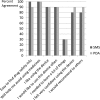Remote Usability Testing and Satisfaction with a Mobile Health Medication Inquiry System in CKD
- PMID: 26220816
- PMCID: PMC4527038
- DOI: 10.2215/CJN.12591214
Remote Usability Testing and Satisfaction with a Mobile Health Medication Inquiry System in CKD
Abstract
Background and objectives: Inappropriate medication use is common in the care of patients with CKD. The feasibility of a simple mobile health tool designed to advise patients on safe medication usage in CKD was examined.
Design, setting, participants, & measurements: Participants with predialysis CKD (defined as eGFR<60 ml/min per 1.73 m(2)) in the Safe Kidney Care Cohort Study were recruited for home usability testing of a novel medication inquiry system between January and September of 2013. Testing was through two mobile platforms: (1) short messaging service text or (2) personal digital assistant (e.g., iPod Touch). Twenty participants (one half assigned to one device and one half assigned to the other device) were enrolled and received an in-center tutorial on device usage before the end of the study visit. Participants were subsequently mailed three sample pill bottles with the name of randomly selected medications and asked to input these medications into the medication inquiry system. The medication inquiry system response options were as follows: (1) safe in CKD, (2) not safe in CKD, (3) use with caution/speak with your health care provider, or (4) error message (for an incorrectly inputted medication). Participants were asked to record the response issued by the medication inquiry system for each medication sent for usability testing. A user satisfaction survey was administered after completion of the protocol.
Results: All participants owned a mobile telephone, but few owned a smartphone. Of 60 total medication queries, there were only three recorded errors, two of which occurred in the short messaging service texting group. Overall satisfaction with the application was high, with slightly higher satisfaction noted in the personal digital assistant group compared with the short messaging service group.
Conclusions: The mobile health medication inquiry system application had general ease of use and high acceptance across two platforms among individuals representative of the CKD population. Tailored mobile health technology may improve medication safety in CKD.
Keywords: CKD; mobile health; patient safety.
Copyright © 2015 by the American Society of Nephrology.
Figures


Comment in
-
Medication Safety + Mobile Health = Patient Engagement in CKD.Clin J Am Soc Nephrol. 2015 Aug 7;10(8):1314-5. doi: 10.2215/CJN.06970615. Epub 2015 Jul 28. Clin J Am Soc Nephrol. 2015. PMID: 26220817 Free PMC article. No abstract available.
References
-
- Fink JC, Chertow GM: Medication errors in chronic kidney disease: one piece in the patient safety puzzle. Kidney Int 76: 1123–1125, 2009 - PubMed
-
- Minutolo R, De Nicola L, Mazzaglia G, Postorino M, Cricelli C, Mantovani LG, Conte G, Cianciaruso B: Detection and awewareness of moderate to advanced CKD by primary care practitioners: A cross-sectional study from Italy. Am J Kidney Dis 52: 444–453, 2008 - PubMed
-
- Stevens LA, Fares G, Fleming J, Martin D, Murthy K, Qiu J, Stark PC, Uhlig K, Van Lente F, Levey AS: Low rates of testing and diagnostic codes usage in a commercial clinical laboratory: Evidence for lack of physician awareness of chronic kidney disease. J Am Soc Nephrol 16: 2439–2448, 2005 - PubMed
-
- Boulware LE, Troll MU, Jaar BG, Myers DI, Powe NR: Identification and referral of patients with progressive CKD: a national study. Am J Kidney Dis 48: 192–204, 2006 - PubMed
Publication types
MeSH terms
Grants and funding
LinkOut - more resources
Full Text Sources
Medical
Research Materials
Miscellaneous

